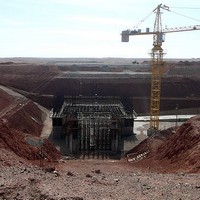Recent years have witnessed a significant increase in both labor disputes and regulatory burden in the resources sector across the world. The ongoing mining sector unrest in South Africa, marked by widespread wildcat action and shocking levels of violence, suggests that these pressures continue to mount and that previous policy responses may prove insufficient. Moreover, there is a risk that the disorder seen in South Africa may presage a new, even more contentious phase of global resource exploitation characterized by a higher incidence of resource nationalism in both developing and developed economies.
Resource nationalism can take many forms (.pdf). At its most extreme, it involves the forced nationalization of natural resource assets, as witnessed with Argentina's seizure of Repsol YPF, the country’s largest oil company, earlier this year. More moderate interpretations have recently been introduced in countries such as Mongolia and Indonesia, where governments tightened restrictions on foreign ownership of resource assets. Even the Canadian government has intervened in several foreign deals of late, while in Peru and Australia, authorities have introduced so-called mining super-taxes on the sector. South Africa, which has been debating its own super-tax, is now scrambling to contain a labor crisis that is already dragging on the country's economy and unsettling global investors.
Resource nationalism is by no means a new trend, but the structures and development of modern global commodities markets are contributing to its resurgence. The latest leg of the global commodities cycle, driven by huge increases in money supply from the U.S., Europe and China over the past decade, caused raw material prices to increase dramatically and global mining investment to triple on an annual basis between 2002 and 2008. Resource-rich nations have found their economic and political landscapes redrawn by these capital inflows, but few have created adequate environmental, labor and fiscal regulatory frameworks for managing this transformation. The result is growing labor market tension and a tendency toward hurried, post hoc policy responses that often do little to address the causal factors.

